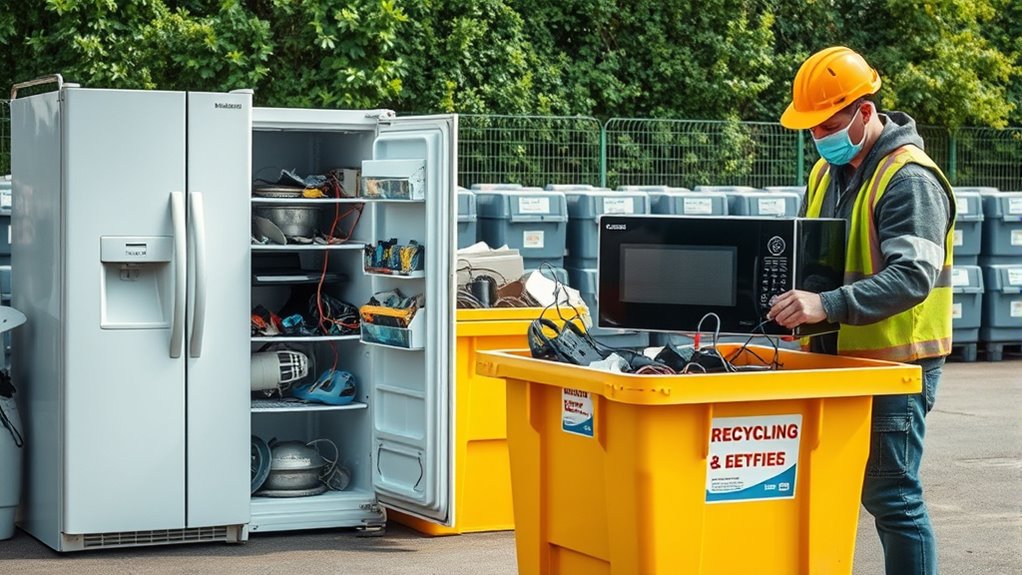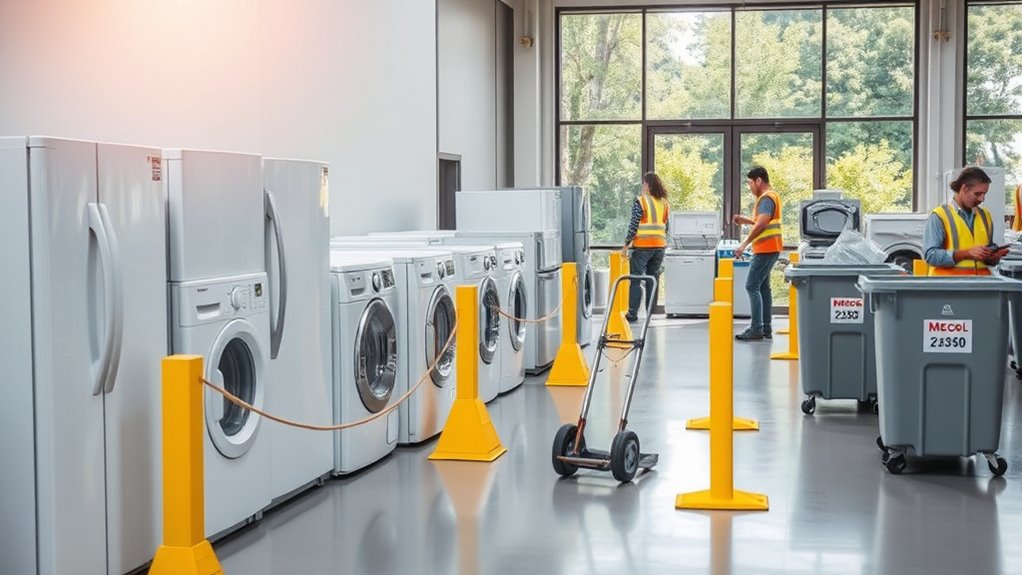To recycle your old appliances responsibly, check local disposal options like designated recycling centers, curbside programs, or retailer take-back services. Make sure to remove any personal data or hazardous components like refrigerants or batteries before recycling. Many centers recover valuable materials and safely handle hazardous substances, helping protect the environment from pollution. If you want to learn about specific steps for different appliances and community initiatives, keep exploring ways to dispose properly.
Key Takeaways
- Use local designated recycling centers or curbside programs to dispose of appliances responsibly.
- Remove personal data and hazardous components, such as refrigerants or batteries, before recycling.
- Check with retailers or community events for e-waste collection options.
- Ensure appliances are properly prepared to prevent environmental harm during recycling.
- Support the circular economy by recycling valuable materials like metals, plastics, and glass.

Recycling old appliances is an essential step to reduce waste and protect the environment. When you toss out outdated refrigerators, washing machines, or microwaves, you’re contributing to the growing problem of electronic waste. Electronic waste, or e-waste, contains hazardous materials that can harm ecosystems and human health if not properly managed. That’s why it’s vital to handle these items responsibly. One of the best ways to do this is by taking your old appliances to recycling centers. These facilities are equipped to safely dismantle and process electronic waste, ensuring that hazardous substances are contained and valuable materials are recovered.
Recycling old appliances reduces waste, prevents environmental harm, and recovers valuable materials through specialized recycling centers.
You might wonder where to find local recycling centers that accept appliances. Many municipalities have designated drop-off points or curbside collection programs specifically for electronic waste. You can start by checking your city’s waste management website or calling your local sanitation department. Some retailers and appliance stores also offer recycling services when you purchase new appliances, so it’s worth asking about their programs. When bringing your old appliances to recycling centers, make sure to remove any personal items or sensitive data, especially from devices like computers or smart appliances. Proper preparation helps protect your privacy and guarantees the recycling process is smooth.
Another important step is to understand what appliances are accepted at these centers. Most recycling centers accept large household appliances like refrigerators, freezers, dishwashers, and washing machines. Smaller appliances such as toasters, microwaves, and vacuums are often accepted as well. However, it’s wise to verify beforehand if there are any restrictions or fees involved. Some appliances contain refrigerants or batteries that require special handling, so inform the center about what you’re bringing. This helps guarantee that each appliance is processed safely and in accordance with environmental regulations.
Recycling centers don’t just break down appliances; they also recover valuable materials like metals, plastics, and glass, which can be repurposed into new products. By choosing to recycle your old appliances at these centers, you’re actively preventing harmful substances from leaching into the soil or water, and you’re contributing to a circular economy. If you can’t transport large appliances yourself, look into local pickup services or community collection events. Many organizations organize periodic e-waste drives to make recycling easier and more accessible.
In short, responsibly disposing of old appliances through reputable recycling centers is a simple, impactful way to minimize electronic waste. It guarantees hazardous materials are contained, valuable resources are recovered, and the environment stays protected. So next time your appliance reaches the end of its life, remember to choose recycling—it’s a small act with a big positive effect.
Frequently Asked Questions
Are There Any Fees for Appliance Recycling Services?
You might encounter appliance recycling costs or recycling service fees, but it differs depending on your location and the type of appliance. Many programs offer free recycling for small appliances or provide discounts for certain items. Always check with your local recycling center or service provider beforehand, as some may charge fees for large appliances or special handling. Being informed helps you avoid unexpected costs and ensures responsible disposal.
Can I Recycle Appliances in My Regular Trash?
Imagine your old appliance as a fallen leaf—meant to return to the earth, not the trash heap. You shouldn’t toss appliances in your regular trash, as it’s unsafe and unsustainable. Instead, consider eco-friendly disposal options like appliance donation or recycling centers. These methods guarantee your appliance’s materials are reused or properly disposed of, helping reduce waste and protect the environment. Always choose responsible disposal over the landfill.
What Should I Do if an Appliance Contains Hazardous Materials?
If an appliance contains hazardous materials, you should prioritize safe hazardous waste disposal. Wear appliance safety precautions like gloves and goggles, and avoid breaking or damaging the appliance. Contact your local hazardous waste facility for proper disposal instructions, as these materials shouldn’t go in regular trash. Proper handling guarantees environmental safety and prevents health risks. Never attempt to dismantle or dispose of hazardous components without professional guidance.
How Do I Prepare Appliances for Recycling?
To prepare appliances for recycling, start by unplugging and disconnecting all power sources. Remove any removable parts like doors or cords, following recycling guidelines. Clean the appliance to prevent leaks or spills and check for hazardous materials, especially in older models. Document any serial numbers or labels. These steps guarantee safe appliance preparation, making recycling easier and compliant with local recycling guidelines.
Are There Specific Days for Appliance Pickup or Drop-Off?
Yes, there are specific appliance pickup schedules and drop-off locations you should verify. Contact your local waste management or recycling center to find out their pickup days for large appliances. Many communities also have designated appliance drop-off locations, often at recycling centers or special events. Planning ahead ensures you can easily dispose of your old appliances responsibly, avoiding fines or environmental harm. Always confirm schedules and locations in advance.
Conclusion
By recycling your old appliances responsibly, you’re giving them a second life and helping the environment thrive. Think of it as turning your clutter into a treasure trove of resources, rather than letting it become a burden on landfills. Remember, every small step counts—so choose eco-friendly disposal options and encourage others to do the same. Together, we can create a cleaner, brighter future, one appliance at a time.









